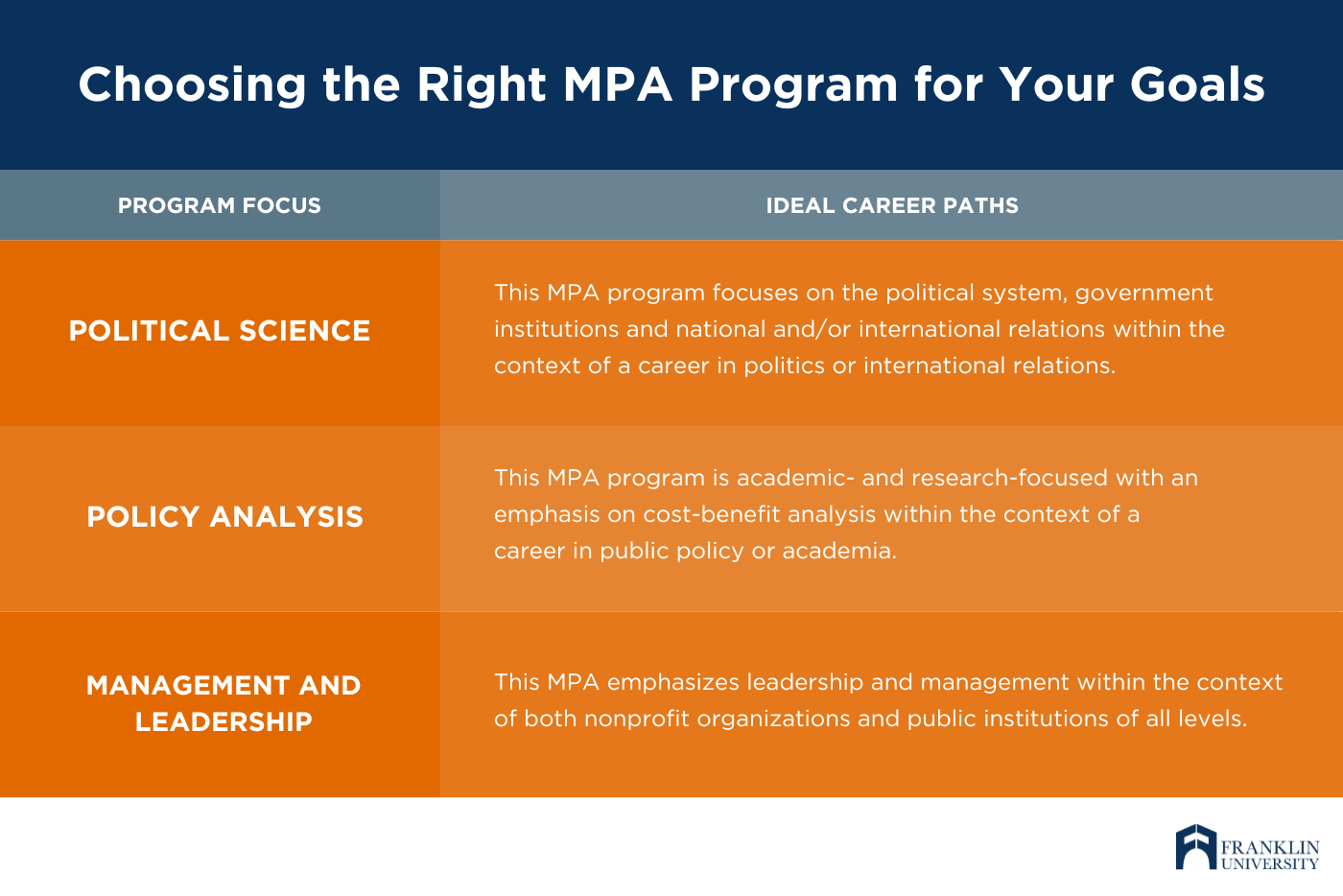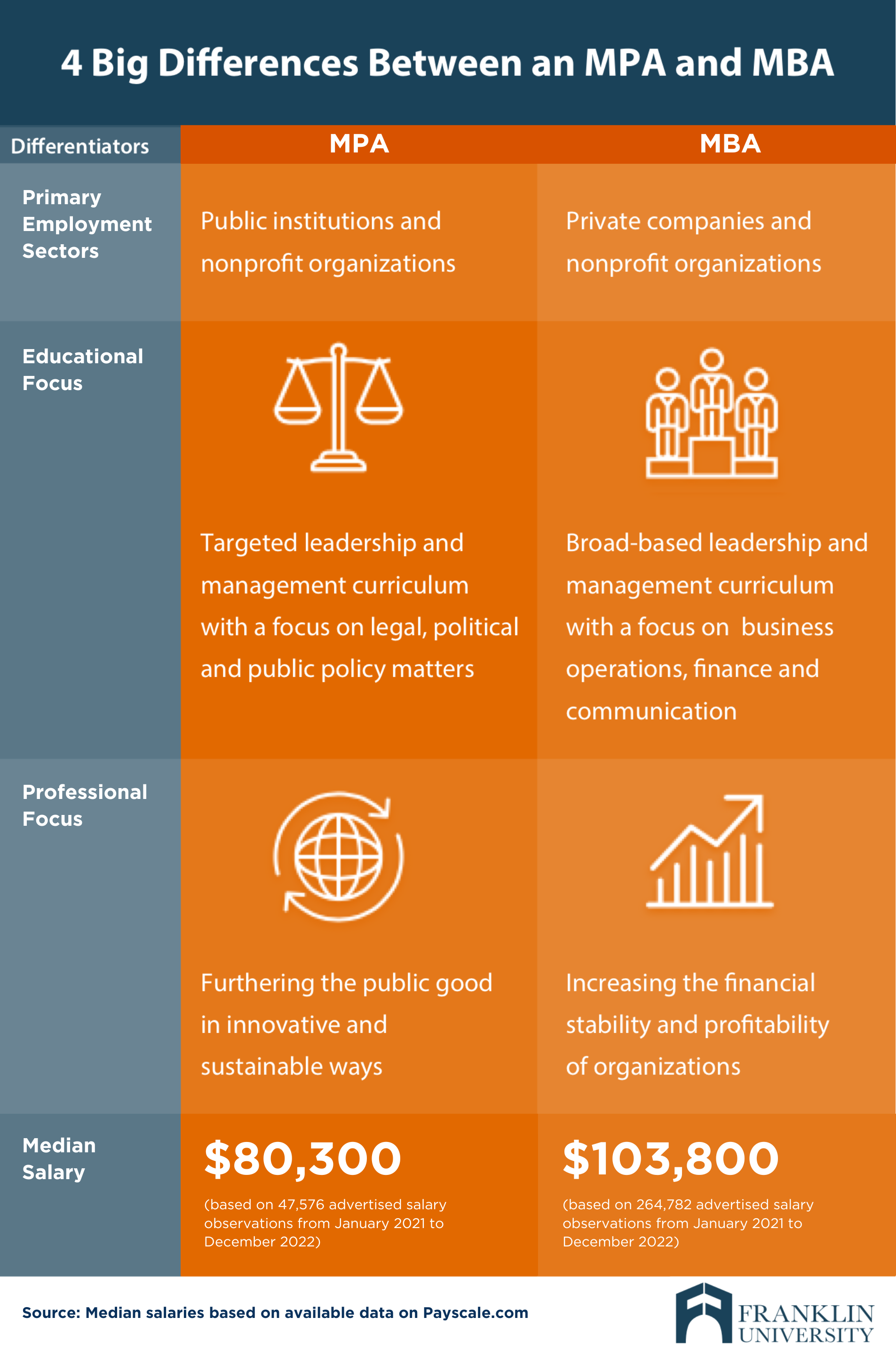Request Information
We're Sorry
There was an unexpected error with the form (your web browser was unable to retrieve some required data from our servers). This kind of error may occur if you have temporarily lost your internet connection. If you're able to verify that your internet connection is stable and the error persists, the Franklin University Help Desk is available to assist you at helpdesk@franklin.edu, 614.947.6682 (local), or 1.866.435.7006 (toll free).
Just a moment while we process your submission.

MPA vs. MBA: Which Is Better for Your Career?
The Master of Public Administration (MPA) and Master of Business Administration (MBA) are both powerhouse degrees.
So, when it comes to answering the question of whether you should get an MPA or MBA, which is better for you and your future?
Both an MPA and an MBA can help you level-up your career. However, before you decide which is right for you, you might want to learn more about their similarities and the differences.
Keep reading for a closer look at MPA and MBA degrees, including what they are, what types of jobs are a good fit for an MPA versus an MBA and why you might choose one over the other.
What Is an MPA [and Why Should You Choose It]?
An MPA is a graduate-level degree designed to empower the next generation of leaders with the knowledge and skills needed to help mission-oriented institutions plan for, and address, pressing societal issues.
According to labor market analytics firm Lightcast, 12,201 MPA programs were completed in 2021.
Who Is an MPA Degree For?
If you’re interested in a career devoted to public or community service, an MPA degree could be just what you need. A high-quality MPA degree program can help you deepen your knowledge of public affairs and nonprofit management and administration.
What Will You Learn In an MPA Degree Program?
Although programs vary by institution, in general, the curriculum of an MPA is specifically designed to increase your knowledge of the political system, instill public service values and strengthen your decision-making skills.
What Is the Focus of an MBA Program’s Curriculum?
The curriculum of an MPA degree program is specifically designed to increase your knowledge of the political system, instill public service values, and promote complex decision-making skills.
While the focus of an MBA degree program and its courses vary by institution, there are three common types of MPA programs, each with a different career focus:
What matters most when choosing a master’s program? Compare features, benefits and cost to find the right school for you.

1. Political Science
This MPA program focuses on the political system, government institutions and national and/or international relations within the context of a career in politics or international relations.
2. Policy Analysis
This MPA program is academic- and research-focused with an emphasis on cost-benefit analysis within the context of a career in public policy or academia.
3. Management and Leadership
This MPA emphasizes leadership and management within the context of both nonprofit organizations and public institutions of all levels.
What is an MBA [and Why Should You Choose It]?
An MBA is considered one of the most flexible advanced degrees because of its broad-based business curriculum. An MBA can equip you with the critical-thinking and leadership skills to better enable you to lead change, develop business opportunities, and promote a competitive advantage.
Lightcast reported that 105,395 MBA programs were completed in 2021.
Who Is an MBA Degree For?
If you’re looking to broaden your business acumen and prefer working at a for-profit organization, an MBA degree could be right for you. A high-quality MBA degree program can help you gain expertise in foundational business management and leadership practices with a focus on increasing profitability.
What Will You Learn In an MBA Degree Program?
Although programs vary by institution, the curriculum of an MBA is designed to help you become more well-rounded in all aspects of managing an organization's finances and staff (known as a general MBA) or to increase your knowledge in a specific area of business (a specialized MBA).
7 Things a General MBA Program Should Include
1. Accounting
Understand sophisticated accounting principles so you can better manage an organization’s expenditures.
2. Finance
Learn to read and understand corporate financial statements to assess the value of an organization and its investments.
3. Human Resources
Discover how to manage your organization's associates, including best practices for recruiting and retaining top talent.
4. Marketing
Find out how to analyze consumer behavior, and develop product promotion and pricing strategies.
5. Operations
Gain insight into how to more effectively manage operations, such as supply chain, inventory and quality control.
6. Economics
Understand the effect of supply and demand on organizations and industries.
7. Leadership and Ethics
Create an organizational vision and strategy, as well as an implementation plan.
What’s the Difference Between an MPA and an MBA?
As a public sector or nonprofit employee, you’re driven by creating positive change in the world.
To increase your impact and act as a leader in government or a nonprofit—or transition into a private sector career—a master’s degree can be key to advancing your job prospects and salary expectations.
While both an MPA degree program and an MBA degree program teach leadership and management skills while helping you develop expertise in managing people and budgets, deciding which is right for you depends on your professional interests, goals and career aspirations.
Here’s a side-by-side comparison of the four biggest differences between an MPA and an MBA:

1. Primary Employment Sectors
- MPA: Public institutions and nonprofit organizations
- MBA: Private companies and nonprofit organizations
2. Educational Concentration
- MPA: Targeted leadership and management curriculum with an emphasis on legal, political and public policy matters
- MBA: Broad-based leadership and management curriculum with an emphasis on business, operations, finance and marketing
3. Professional Focus
- MPA: Furthering the public good in innovative and sustainable ways
- MBA: Increasing the financial stability and profitability of organizations
4. Salary
- MPA: $80,300
- MBA: $103,800
5 In-Demand Jobs for MPA Graduates
Paired with your professional experience, an MPA degree can help you advance your career at all levels of government and the nonprofit sector. Here’s a look at five of the top jobs for MPA graduates according to Lightcast.
1. City Manager
Average Salary: $189,530
A city manager oversees the running of a city's municipal government, including accounting and purchasing. Financial management skills are crucial because the manager directly oversees the city’s budget.
2. Nonprofit Director
Average Salary: $74,235
The nonprofit director is the equivalent of a CEO, helping guide the vision and direction of the organization, manage operations, and work closely with the board of directors.
3. Legislative Director
Average Salary: $129,438
A legislative director leads a team of policy experts to develop and implement public policies. The legislative director establishes financial goals and oversees timing and budget of these programs, as well as builds relationships to advance a legislative agenda.
4. Foundation Development Director
Average Salary: $107,390
The lead fundraiser of a nonprofit, the development director ensures an organization has the funds necessary to operate and accomplish its goals. The development director creates strategic plans for how to raise money and build relationships with high-value donors.
5. County Administrator
Average Salary: $189,530
A county administrator is a non-elected government official who supervises the day-to-day operations of a county government. County administrators oversee the departments that deliver services to the community, help develop budgets, and participate in government meetings.
5 Hot Jobs for MBA Graduates
Most MBA graduates work in private sector companies, however an MBA also can also prepare you for similar roles in the nonprofit world. Here’s a look at five in-demand careers for MBA grads according to Lightcast.
1. Investment Manager
Average Salary: $139,797
Investment managers develop investment strategies based on current market trends and manage investment portfolios to increase returns. At a nonprofit, these types of roles typically manage endowments.
2. Economic Development Director
Average Salary: $74,235
These professionals are responsible for developing innovative policies that facilitate growth. They also collaborate with members of a community to accomplish goals.
3. Business Operations Manager
Average Salary: $98,093
A business operations manager identifies, plans, and creates strategies and processes for daily business operations to ensure the financial needs and goals of an organization are met.
4. Budget Analyst
Average Salary: $82,264
A budget analyst helps both private and public organizations effectively manage their finances. They prepare budget reports, evaluate budget proposals and monitor institutional spending.
5. Director of Human Resources
Average Salary: $130,000
Both for-profit and nonprofit organizations need HR directors to lead hiring, training and coaching employees, as well as manage salary and benefits, promote team building and further leadership skills among management.
Which Is Better, an MPA or an MBA?
Both the MPA and the MBA can be career-changing credentials.
So, whether you want to work in government, with a nonprofit or for a private organization, choose the one that makes sense for you.
Either way, an advanced degree such as an MPA or an MBA is a powerful way to fuel your career and boost your earnings potential.





